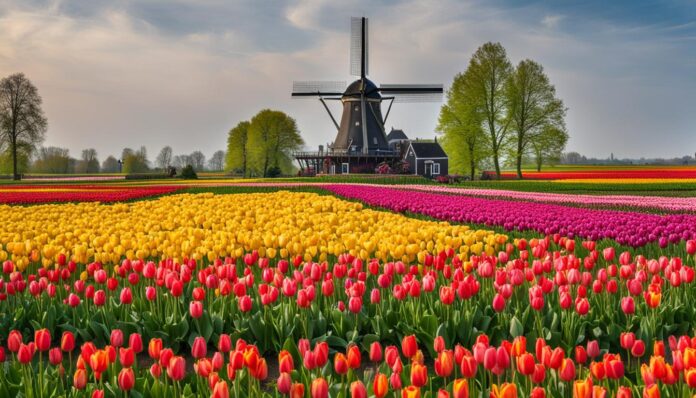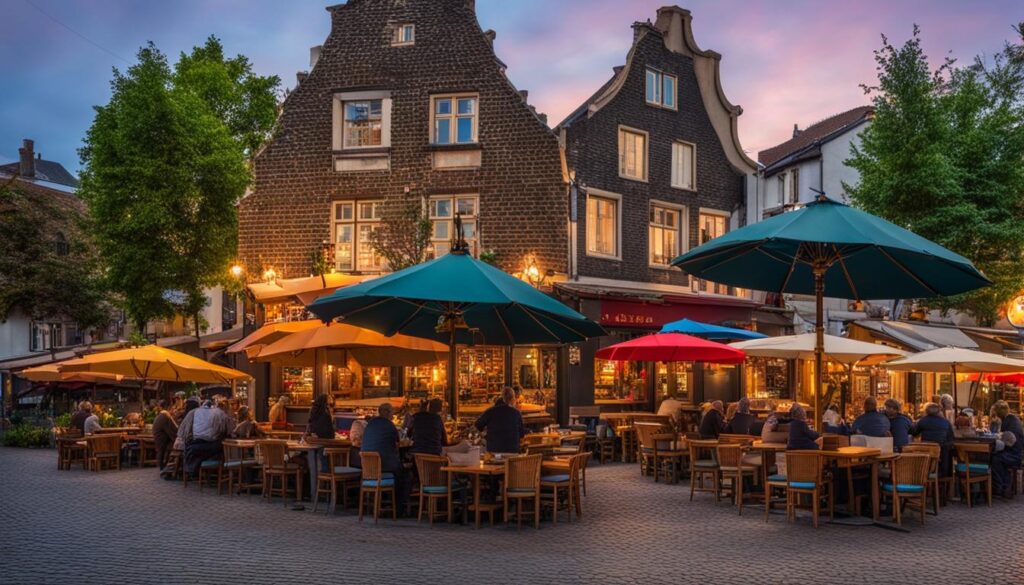Are you planning a trip to Western Europe and wondering which country to visit? Or are you considering relocating to either the Netherlands or Belgium? This article will provide you with a comprehensive country comparison to help you decide which one is better suited to your needs and preferences.
The Netherlands and Belgium are neighboring countries with many similarities, yet they have distinct differences that could significantly impact your experience. Whether it’s the cultural scene, cuisine, cost of living, or quality of life, there are several factors to consider when choosing between these two nations.
Keep reading to compare the Netherlands and Belgium on multiple dimensions and learn which country aligns better with your interests. Netherlands vs. Belgium: which country is better for me? This guide will assist you in making an informed decision, and we hope you find it helpful in planning your trip or relocation.
Introduction to the Netherlands and Belgium
When choosing between the Netherlands and Belgium, it’s essential to understand their geography, history, and general characteristics. Both countries are located in northwestern Europe, with the Netherlands to the north and Belgium to the south.
The Netherlands is known for its flat landscape, dykes, windmills, and tulip fields. Meanwhile, Belgium boasts of its medieval architecture, beer, chocolate, and waffles.
Despite their cultural and linguistic differences, both countries share a rich history that has shaped their identity and traditions. The Netherlands is famous for its Golden Age, which saw a flourishing of art, trade, and science. Belgium, on the other hand, has a complex history due to its position as a battleground for neighboring powers throughout the centuries.
Whether you’re drawn to the Netherlands’ picturesque countryside or Belgium’s vibrant cities, it’s clear that both countries have much to offer. So, let’s explore each country in more detail to help you make a decision.
Cultural Differences Between the Netherlands and Belgium
Both the Netherlands and Belgium have a rich culture, steeped in history and traditions. However, there are significant differences between the two countries that are worth exploring when deciding which one suits you better. Let’s take a closer look at some of the cultural variations you can expect when living in the Netherlands or Belgium.
Language
The most obvious difference between the Netherlands and Belgium is the language spoken. The official language of the Netherlands is Dutch, with the majority of people speaking English fluently as well. On the other hand, Belgium has three official languages: Dutch, French, and German. The language you speak will determine the region where you can comfortably live in, as areas with different languages are spread out throughout Belgium.
Traditions and customs
The Netherlands and Belgium share some traditions, such as Christmas markets, Easter brunches, and Saint Nicholas celebrations. However, they also have significant differences in customs. The Netherlands has a strong emphasis on equality and directness, whereas Belgium is more hierarchical and diplomatic in its approach to communication. Belgians have a reputation for being reserved and private, whereas the Dutch are known for their friendliness and informal behavior.
Food and drink
The cuisine of the Netherlands and Belgium also has some similarities and differences. Both countries are famous for their love of beer and chocolate. However, Belgian cuisine is known for its hearty stews and rich sauces, while Dutch cuisine is more focused on simple dishes like stamppot – a mix of mashed potatoes, vegetables, and sausage.
Overall way of life
The Netherlands and Belgium have different overall vibes, reflecting their cultural differences. The Netherlands has a reputation for being liberal and open-minded, with progressive attitudes towards social issues. The pace of life is fast, and it’s common to bike to work or walk to the grocery store. On the other hand, Belgium is known for its slower pace of life, with an emphasis on hospitality and living well. Belgians enjoy their food and drink, and the country is famous for its beautiful architecture, historic landmarks, and world-class museums.
Exploring the Sights and Attractions
Both the Netherlands and Belgium boast of a plethora of sights and attractions, ranging from iconic landmarks and historical sites to museums and natural wonders. Whether you prefer enjoying the vibrant nightlife or discovering the country’s cultural treasures, there is something for everyone.
Landmarks in the Netherlands
The Netherlands is renowned for its picturesque canals, and one of the most iconic sights in the country is the canal district in Amsterdam. Other notable landmarks include:
| Attractions | Location |
|---|---|
| The Rijksmuseum | Amsterdam |
| Van Gogh Museum | Amsterdam |
| Keukenhof Gardens | Lisse |
| Cube Houses | Rotterdam |
Landmarks in Belgium
Belgium is home to exquisite landmarks encompassing Gothic architecture, natural beauty, and significant historical sites. Here are some of the top attractions to explore:
| Attractions | Location |
|---|---|
| The Atomium | Brussels |
| Grand Place | Brussels |
| Historic Centre of Bruges | Bruges |
| Citadel of Dinant | Dinant |
Whether you choose to visit the charming Bruges or the vibrant city of Amsterdam, both the Netherlands and Belgium offer visitors an extensive array of unique attractions to explore.
Cuisine and Gastronomy
One of the defining features of Dutch cuisine is its focus on hearty, comfort food. Traditional dishes such as stamppot, a mashed potato and vegetable dish served with sausage or bacon, are popular choices. Another beloved snack is the bitterballen, a deep-fried meat-based snack that is paired with mustard sauce. The Netherlands is also known for its sweet treats such as stroopwafels, thin waffles filled with caramel syrup, or poffertjes, tiny fluffy pancakes dusted with powdered sugar.
On the other hand, Belgian cuisine is world-renowned for its chocolate and beer. From luxurious pralines to decadent truffles, Belgian chocolates are a must-try for any chocolate lover. Belgian beer is also a point of pride, with many famous breweries scattered across the country. When it comes to food, Belgian dishes such as moules-frites, a dish of steamed mussels served with fries, and waterzooi, a creamy stew made with fish or chicken, are fan-favorites.
If you have a sweet tooth, the Belgian waffles served with strawberries and whipped cream are a must-try delicacy.
Regardless of which country you choose, make sure to indulge in the local cuisine. A great way to experience the food culture is to visit local markets or try traditional restaurants. Bon appétit!
Quality of Life Factors
When considering a move to a new country, it’s essential to evaluate the quality of life that each option can offer. Here, we’ll compare the Netherlands and Belgium in terms of healthcare, education, safety, public transportation, and work-life balance, so you can make an informed decision that suits your needs.
Healthcare
Both the Netherlands and Belgium are known for having high-quality healthcare systems. In the Netherlands, health insurance is mandatory, and you can choose from a variety of plans that cover your medical expenses. Dutch healthcare is affordable and efficient, with short wait times and access to top-notch medical facilities. In Belgium, healthcare is also of high quality and affordable, but the system is organized differently. You can choose to have national or private insurance, and you pay for your healthcare upfront, with most of the fee reimbursed afterwards.
Education
Both the Netherlands and Belgium have excellent education systems, with a wide variety of options for students of all ages. Primary, secondary, and tertiary education is free and widely available in both countries. The Netherlands is renowned for its innovative approach to education, and its universities are rated among the best in Europe. Belgium has a diverse range of universities and is particularly strong in the fields of medicine, engineering, and business.
Safety
The Netherlands and Belgium are both considered safe countries, with low crime rates and a high standard of living. The Netherlands has a reputation for being one of the safest countries in the world, with low rates of violent crime and a well-funded police force. Belgium is also generally safe, but there have been occasional reports of pickpocketing and petty theft in tourist areas, so it’s important to exercise caution in these areas.
Public Transportation
The Netherlands and Belgium both have highly developed public transportation systems that are convenient and affordable. In the Netherlands, the train network is extensive and efficient, and there are also buses, trams, and metros that connect the major cities. Belgium has a similarly extensive train network, as well as buses, trams, and metros. Both countries have invested heavily in cycling infrastructure, making cycling a popular and practical mode of transportation.
Work-Life Balance
The Netherlands and Belgium are known for having a good work-life balance, with generous holiday allowances and flexible working hours. In the Netherlands, the average workweek is 29 hours, and employees receive a minimum of 20 days of paid vacation per year. In Belgium, the average workweek is 38 hours, and employees receive a minimum of 20 days of paid vacation per year, as well as additional paid leave for public holidays.
Overall, both the Netherlands and Belgium offer a high quality of life with excellent healthcare, education, safety, and transportation systems, as well as a good work-life balance. Your decision may come down to personal preferences for factors such as language, climate, and cost of living.
Cost of Living
When deciding between the Netherlands and Belgium, the cost of living is an essential factor to consider. It’s crucial to understand what expenses you will likely incur daily, monthly, and annually in each country. This knowledge can help you determine which country is a better economic fit for you.
According to Numbeo, which compares the cost of living in various countries, the overall cost of living in the Netherlands is generally higher than in Belgium. For instance, the consumer prices in the Netherlands are approximately 9.38% higher compared to Belgium. Additionally, the rent prices in the Netherlands are about 20.01% higher than in Belgium.
However, your lifestyle can also influence the cost of living in each country. If you prefer living in the city center, you may spend more on housing in both countries, but it can be more expensive in the Netherlands. Similarly, if you prefer a rural setting, you may save more on housing in Belgium.
When shopping for groceries, you can expect to spend less in Belgium, where the average grocery prices are approximately 9.46% lower than in the Netherlands. Likewise, you can find cheaper entertainment and leisure activities in Belgium, where the cinema tickets and restaurant prices are lower than in the Netherlands.
| Expense | Netherlands | Belgium |
|---|---|---|
| Consumer Prices | 9.38% higher | N/A |
| Rent Prices | 20.01% higher | N/A |
| Grocery Prices | N/A | 9.46% lower |
| Cinema Tickets | 5.52% higher | 13.23% lower |
| Restaurant Prices | 4.21% higher | 7.85% lower |
Ultimately, understanding the cost of living in each country can help you plan your budget and make an informed decision. While the cost of living may vary depending on your preferences and lifestyle, the data presented above can serve as a starting point when considering the long-term financial implications of living in either the Netherlands or Belgium.
Language Considerations
When it comes to language considerations, the Netherlands and Belgium have quite a few differences. Dutch is the official language of the Netherlands, while in Belgium, there are three official languages: Dutch, French, and German.
The good news is that English is widely spoken in both countries, making it easy for English speakers to communicate and get around. In fact, you’ll find that most Dutch and Belgian locals speak English fluently, especially in the larger cities. This is great news for travelers and expats who don’t speak Dutch, French, or German.
However, if you plan to live in the Netherlands or Belgium long-term, learning the native language can be a significant factor in your decision. Not only will it help you navigate daily life, but it can also help you connect with locals and feel more at home.
If you’re considering the Netherlands or Belgium for their language programs, both countries are excellent choices. Dutch and French language courses are available at a variety of levels and institutions. Additionally, there are plenty of language exchange programs and private tutors available if you prefer a more tailored approach.
Dutch Language Snapshot
| Dutch Language | Snapshot |
|---|---|
| Native speakers | About 24 million |
| Official language in | Netherlands, Belgium, Suriname |
| Writing system | Latin script |
| Closely related to | Afrikaans, Limburgish, Low Saxon |
French Language Snapshot
| French Language | Snapshot |
|---|---|
| Native speakers | About 300 million worldwide |
| Official language in | France, Belgium, Switzerland, Canada, many African countries |
| Writing system | Latin script |
| Closely related to | Other Romance languages, such as Spanish, Italian, and Portuguese |
Climate and Weather
When comparing the climate and weather in the Netherlands and Belgium, there are several factors to consider. The two countries share a similar climate due to their close proximity in Western Europe, but there are some notable differences.
| Netherlands | Belgium | |
|---|---|---|
| Temperature | In the summer months, temperatures in the Netherlands can reach up to 22℃ (72℉), while in the winter it can drop to an average of 3℃ (37℉). | The summer months in Belgium can reach highs of 23℃ (73℉), while average winter temperatures can drop to around 1℃ (34℉). |
| Rainfall | The Netherlands can have rainy weather for most of the year, ranging from 700mm-800mm on average annually. | Belgium also has a relatively rainy climate with an average annual rainfall of around 800-900mm. |
| Seasonal Variations | The Netherlands experiences four distinct seasons with a mild spring, warm summer, rainy fall, and cold winter. | Belgium also experiences four seasons, with a mild spring, warm summer, rainy fall, and chilly winter. |
Depending on your preferences, one country’s climate may be more suitable than the other. If you enjoy moderate temperatures with mild seasonal variations, either country could be a good fit for you. However, if you prefer warmer weather, Belgium may be the better choice, while The Netherlands would be a preferred choice if you prefer cooler weather.
Transportation and Accessibility
When it comes to transportation and accessibility, both the Netherlands and Belgium have efficient and reliable systems that make it easy to navigate around the countries and beyond. The Netherlands, known for its extensive bike lanes and flat terrain, is one of the most bike-friendly countries in the world, with bikes being a popular mode of transportation. The country also boasts an extensive public transportation system, including an extensive train and bus network, making it easy to travel to different parts of the country and beyond.
Belgium also has an efficient public transportation system, with trains being the primary mode of transportation. The country has a well-connected rail network that makes it easy to travel to neighboring countries such as France, Germany, and the Netherlands. In addition, Belgium offers a bike-sharing system called Villo!, which allows you to rent and return bikes at any of the designated stations throughout Brussels.
Both countries have extensive infrastructure and well-maintained roads, making it easy to drive if you prefer. The highway system in both countries is excellent, and tolls are relatively low compared to other European countries. However, it is important to note that parking in some cities can be difficult and expensive.
Proximity to Other European Countries
The Netherlands and Belgium are both located in the heart of Western Europe and are known for their central location. This makes it easy to travel to other European countries both by train and bus. Amsterdam, for example, is just a few hours away from Paris, making it easy to take a day trip or a weekend getaway. Similarly, Brussels, the capital of Belgium is close to other major European cities such as London, Amsterdam, and Berlin.
Transportation and Accessibility Comparison
| Transportation Mode | Netherlands | Belgium |
|---|---|---|
| Bike | The Netherlands has an extensive bike lane network and bikes are a popular mode of transportation | Belgium has a bike-sharing system called Villo!, making it easy to rent bikes and navigate around Brussels. |
| Public Transportation | The Netherlands has an extensive public transportation system, including an extensive train and bus network, making it easy to travel to different parts of the country and beyond. | Belgium has an efficient public transportation system, with trains being the primary mode of transportation. |
| Driving | The Netherlands has an extensive network of well-maintained roads and a good highway system. However, parking in some cities can be difficult and expensive. | Belgium has an excellent highway system, and tolls are relatively low compared to other European countries. |
| Proximity to Other European Countries | The Netherlands is situated in the heart of Western Europe, making it easy to travel to other European cities. | Belgium is centrally located and has excellent rail connections with neighboring countries. |
Overall, both the Netherlands and Belgium have convenient and accessible transportation systems, making it easy to get around and explore. The proximity of these countries to other European destinations allows for easy travel and exploration beyond national borders.
Pros and Cons of the Netherlands and Belgium
When considering between the Netherlands and Belgium, it’s important to weigh the pros and cons of each country to make an informed decision that aligns with your needs and preferences.
Pros of the Netherlands:
- Strong economy with many job opportunities
- High-quality education system
- Efficient public transportation
- Bicycle-friendly cities
- Beautiful landscapes and heritages
- Liberal and multicultural society
Cons of the Netherlands:
- Expensive cost of living, particularly in Amsterdam and other major cities
- Cold and rainy climate for much of the year
- Dense population, leading to crowded cities and long wait times for healthcare
Pros of Belgium:
- Rich cultural heritage and architecture
- High-quality healthcare system
- Diverse cuisine and excellent beer
- Relatively low cost of living compared to other European nations
- Central location for travel around Europe
- Excellent education system
Cons of Belgium:
- Complicated political structure and occasional social unrest
- Heavy traffic in major cities
- Bureaucratic challenges when trying to access certain services
Ultimately, choosing between the Netherlands and Belgium depends on your individual priorities and lifestyle. Take into account factors such as quality of life, cost of living, cultural differences, climate, and accessibility when making your decision.
The image below illustrates some of the key factors to consider when choosing between the Netherlands and Belgium:
Conclusion
In conclusion, choosing between the Netherlands and Belgium depends on various factors such as cultural preferences, sightseeing options, cuisine, quality of life, cost of living, language compatibility, climate, and transportation accessibility.
Both countries have their unique features that attract tourists and expats from all over the world.
If you are looking for a country with a rich cultural heritage, the Netherlands is a perfect choice for you, with its famous museums, art galleries, and historical landmarks. On the other hand, Belgium is known for its colorful festivals and carnivals, making it an exciting destination for those who love festivities and celebrations.
If you are a foodie, Belgium’s cuisine will charm you with its chocolate, waffles, and beer, while the Netherlands’ culinary scene is more influenced by Indonesian and Surinamese cuisine.
Dutch and Flemish are the official languages spoken in the Netherlands and Belgium, respectively. However, English is widely spoken in both countries, making language barriers less of a concern.
When it comes to the quality of life, both countries offer excellent healthcare, education, safety, and work-life balance. However, the cost of living in the Netherlands is higher than in Belgium, and this can be a significant factor in your decision-making process.
Lastly, transportation accessibility is another factor to consider. The Netherlands has a well-developed transportation system, making it easy to travel within the country or to other European countries. Belgium also has good transportation infrastructure and is conveniently located in the heart of Europe.
Ultimately, the decision to travel or relocate to the Netherlands or Belgium depends on your personal preferences and priorities. We hope this guide has helped you make an informed choice and have an enjoyable experience in either country.
Safe travels!

















































